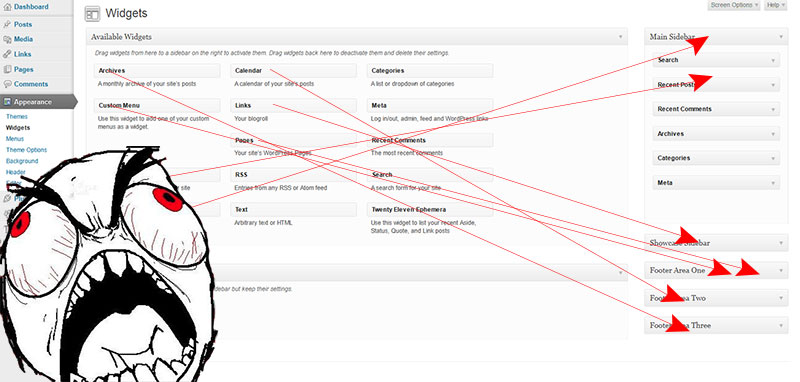It looks like WordPress is getting date queries in 3.7. Fuck yeah!
Blog
-
Improved Date Arguments for WP_Query
#18694 (Improved date arguments for WP_Query) – WordPress Trac -
8BIT Throws in the Towel
 It’s Been Swell! | 8BIT
It’s Been Swell! | 8BITFirst WP Daily was shuttered about a month ago. Now this happens. What the fuck is going on with these dudes?
-
Alternative Post Loops
Alternative Post Loops | Tom J NowellOooh. Me likey.
-
Developing for WordPress? Keep your shit secure.
 Developing for WordPress? Keep your shit secure – Mike JolleyIf you are developing WordPress plugins (or themes) for distribution via WordPress.org, or for client projects, it should be a no-brainer that writing insecure code can lead to severe consequences. Having your plugin pulled from the repository, seeing a loss in respect and end-user confidence, or even worse, seeing users fall victim to easily preventable attacks are all…
Developing for WordPress? Keep your shit secure – Mike JolleyIf you are developing WordPress plugins (or themes) for distribution via WordPress.org, or for client projects, it should be a no-brainer that writing insecure code can lead to severe consequences. Having your plugin pulled from the repository, seeing a loss in respect and end-user confidence, or even worse, seeing users fall victim to easily preventable attacks are all…A lot of great, common sense best practices for WordPress developers from Mike Jolley.
-
WebKit adds support for srcset
 Improved Support for Images on High-Resolution Displays | WebKit
Improved Support for Images on High-Resolution Displays | WebKitRight now, this is only in the nightly builds of WebKit. But I’m still excited. Why? Well, srcset support in browsers inches the world that much closer to the glorious day where we don’t have to depend on fucking Retina.js anymore.
-
WebDevStudios’ Take On a WordPress Core Widget UI Refresh
 WebDevStudios’ Take On a WordPress Core Widget UI Refresh – WebDevStudiosLet’s face it – unless you like devoting your time to clicking, dragging, accidentally letting go of your mouse button, then clicking and dragging again,
WebDevStudios’ Take On a WordPress Core Widget UI Refresh – WebDevStudiosLet’s face it – unless you like devoting your time to clicking, dragging, accidentally letting go of your mouse button, then clicking and dragging again,The guys from WebDevStudios are still thinking about refining the widget management process. And that’s a good thing!
I seriously hope this makes it into 3.8.
-
Create Presentations Easily on WordPress.com with Shortcodes
Create Presentations Easily on WordPress.com with Shortcodes – WordPress.com NewsOn WordPress.com, you can use a number of shortcodes to embed features and create objects with little effort, and make your site look just the way you want. We’re excited to announce new shortcodes you can use to whip up a slideshow presentation — and display it on your WordPress.com site. A sampling of features…Hey there, sexy. Hopefully I’ll see you in Jetpack pretty soon…
-
WordPress.com Connect
 WordPress.com Connect | Developer ResourcesA secure and easy way for millions of WordPress.com users to log in to your website or app. By integrating with WordPress.com Connect, WordPress.com users can quickly log in and start using your service. Their profile information is shared with your app saving you the hassle of collecting name, email address, etc. You even get…
WordPress.com Connect | Developer ResourcesA secure and easy way for millions of WordPress.com users to log in to your website or app. By integrating with WordPress.com Connect, WordPress.com users can quickly log in and start using your service. Their profile information is shared with your app saving you the hassle of collecting name, email address, etc. You even get…This is pretty cool! I mean, once sites implement it I’ll be able to log in using another password I can barely fucking remember.
-
Multi Site Plugins Add New
GitHub – pippinsplugins/Multi-Site-Plugins-Add-New: Enables an Add New link under the Plugins menu for Network adminsEnables an Add New link under the Plugins menu for Network admins – GitHub – pippinsplugins/Multi-Site-Plugins-Add-New: Enables an Add New link under the Plugins menu for Network adminsAdds an “Add New” sub menu item to the Plugins menu of all sites inside of a network for network admins.
Pippin fixes one of the things in Multisite that has annoyed me for, well, basically forever.
Also, there’s a bug for this in Trac. If this has ever made you crazy too, go throw some support its way.
-
The Future of WPDB
/markoheijnen.com/content/uploads/sites/2/2013/08/wp-databasemodel.png) The future of WPDB | Marko HeijnenLately I’m busy with exploring the future of WPDB. Ticket number #21663 on Trac has a lot of discussions and Kurt Payne started with redoing the code.
The future of WPDB | Marko HeijnenLately I’m busy with exploring the future of WPDB. Ticket number #21663 on Trac has a lot of discussions and Kurt Payne started with redoing the code.Excellent thoughts from Marko on the impending removal of
mysql_*()from PHP and what it means for how WordPress (and its plugins) interact with MySQL.



/markoheijnen.com/content/uploads/sites/2/2022/01/cropped-android-chrome-512x512-1.png)